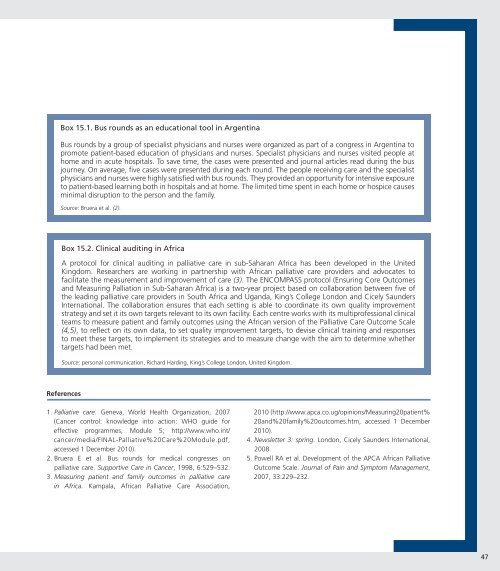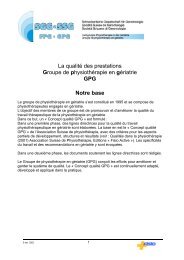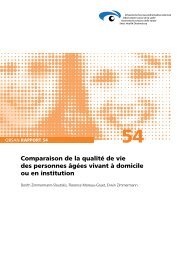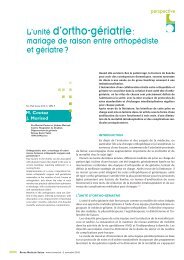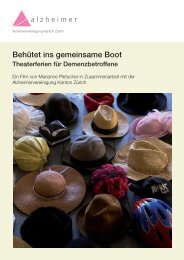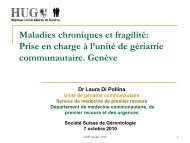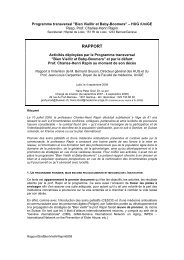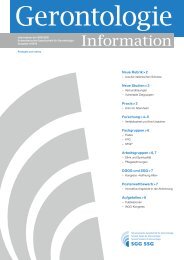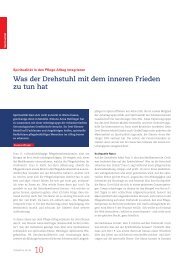Palliative care for older people - World Health Organization ...
Palliative care for older people - World Health Organization ...
Palliative care for older people - World Health Organization ...
Create successful ePaper yourself
Turn your PDF publications into a flip-book with our unique Google optimized e-Paper software.
Box 15.1. Bus rounds as an educational tool in ArgentinaBus rounds by a group of specialist physicians and nurses were organized as part of a congress in Argentina topromote patient-based education of physicians and nurses. Specialist physicians and nurses visited <strong>people</strong> athome and in acute hospitals. To save time, the cases were presented and journal articles read during the busjourney. On average, five cases were presented during each round. The <strong>people</strong> receiving <strong>care</strong> and the specialistphysicians and nurses were highly satisfied with bus rounds. They provided an opportunity <strong>for</strong> intensive exposureto patient-based learning both in hospitals and at home. The limited time spent in each home or hospice causesminimal disruption to the person and the family.Source: Bruera et al. (2).Box 15.2. Clinical auditing in AfricaA protocol <strong>for</strong> clinical auditing in palliative <strong>care</strong> in sub-Saharan Africa has been developed in the UnitedKingdom. Researchers are working in partnership with African palliative <strong>care</strong> providers and advocates tofacilitate the measurement and improvement of <strong>care</strong> (3). The ENCOMPASS protocol (Ensuring Core Outcomesand Measuring Palliation in Sub-Saharan Africa) is a two-year project based on collaboration between five ofthe leading palliative <strong>care</strong> providers in South Africa and Uganda, King’s College London and Cicely SaundersInternational. The collaboration ensures that each setting is able to coordinate its own quality improvementstrategy and set it its own targets relevant to its own facility. Each centre works with its multiprofessional clinicalteams to measure patient and family outcomes using the African version of the <strong>Palliative</strong> Care Outcome Scale(4,5), to reflect on its own data, to set quality improvement targets, to devise clinical training and responsesto meet these targets, to implement its strategies and to measure change with the aim to determine whethertargets had been met.Source: personal communication, Richard Harding, King’s College London, United Kingdom.References1. <strong>Palliative</strong> <strong>care</strong>. Geneva, <strong>World</strong> <strong>Health</strong> <strong>Organization</strong>, 2007(Cancer control: knowledge into action: WHO guide <strong>for</strong>effective programmes, Module 5; http://www.who.int/cancer/media/FINAL-<strong>Palliative</strong>%20Care%20Module.pdf,accessed 1 December 2010).2. Bruera E et al. Bus rounds <strong>for</strong> medical congresses onpalliative <strong>care</strong>. Supportive Care in Cancer, 1998, 6:529–532.3. Measuring patient and family outcomes in palliative <strong>care</strong>in Africa. Kampala, African <strong>Palliative</strong> Care Association,2010 (http://www.apca.co.ug/opinions/Measuring20patient%20and%20family%20outcomes.htm, accessed 1 December2010).4. Newsletter 3: spring. London, Cicely Saunders International,2008.5. Powell RA et al. Development of the APCA African <strong>Palliative</strong>Outcome Scale. Journal of Pain and Symptom Management,2007, 33:229–232.47


